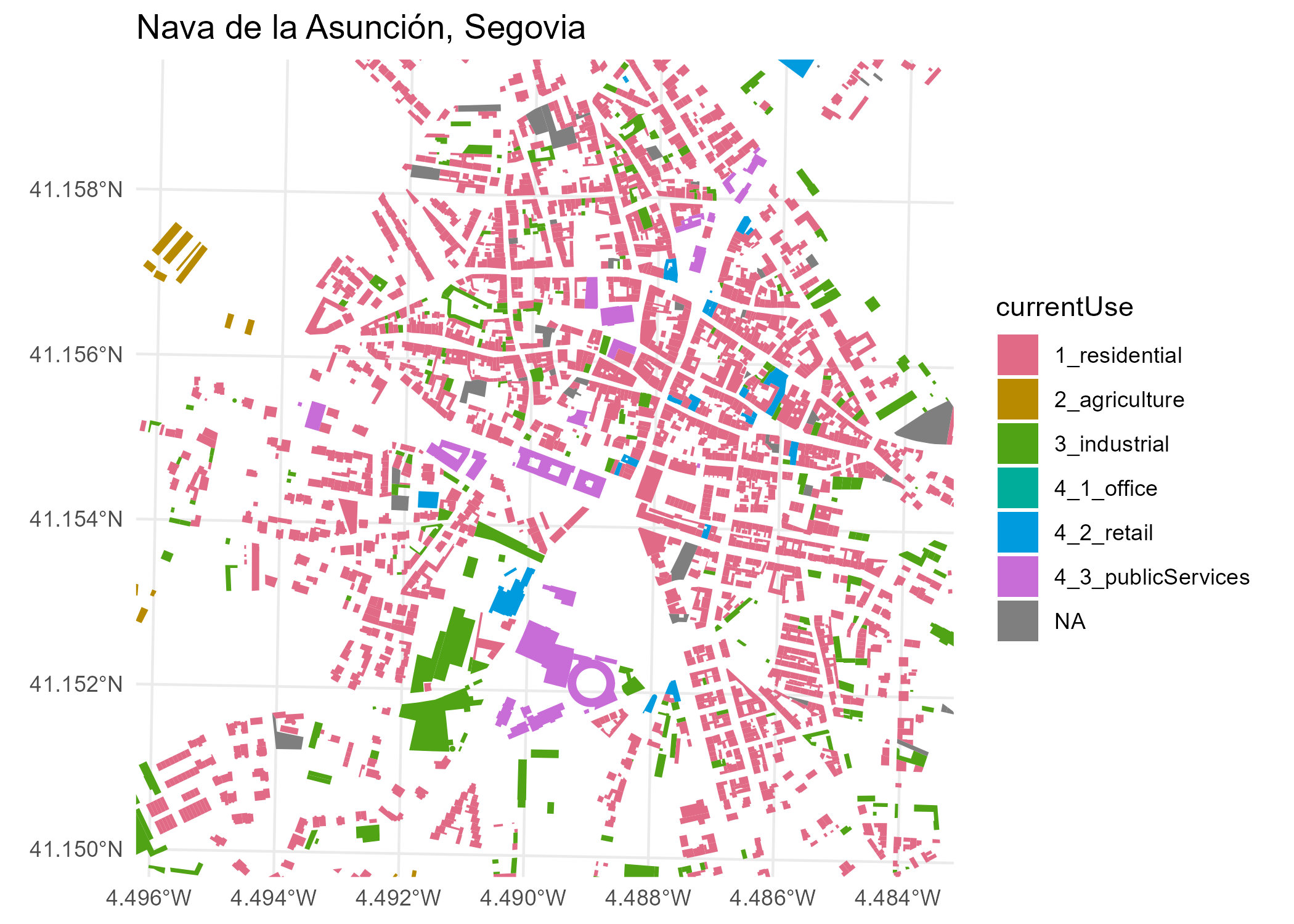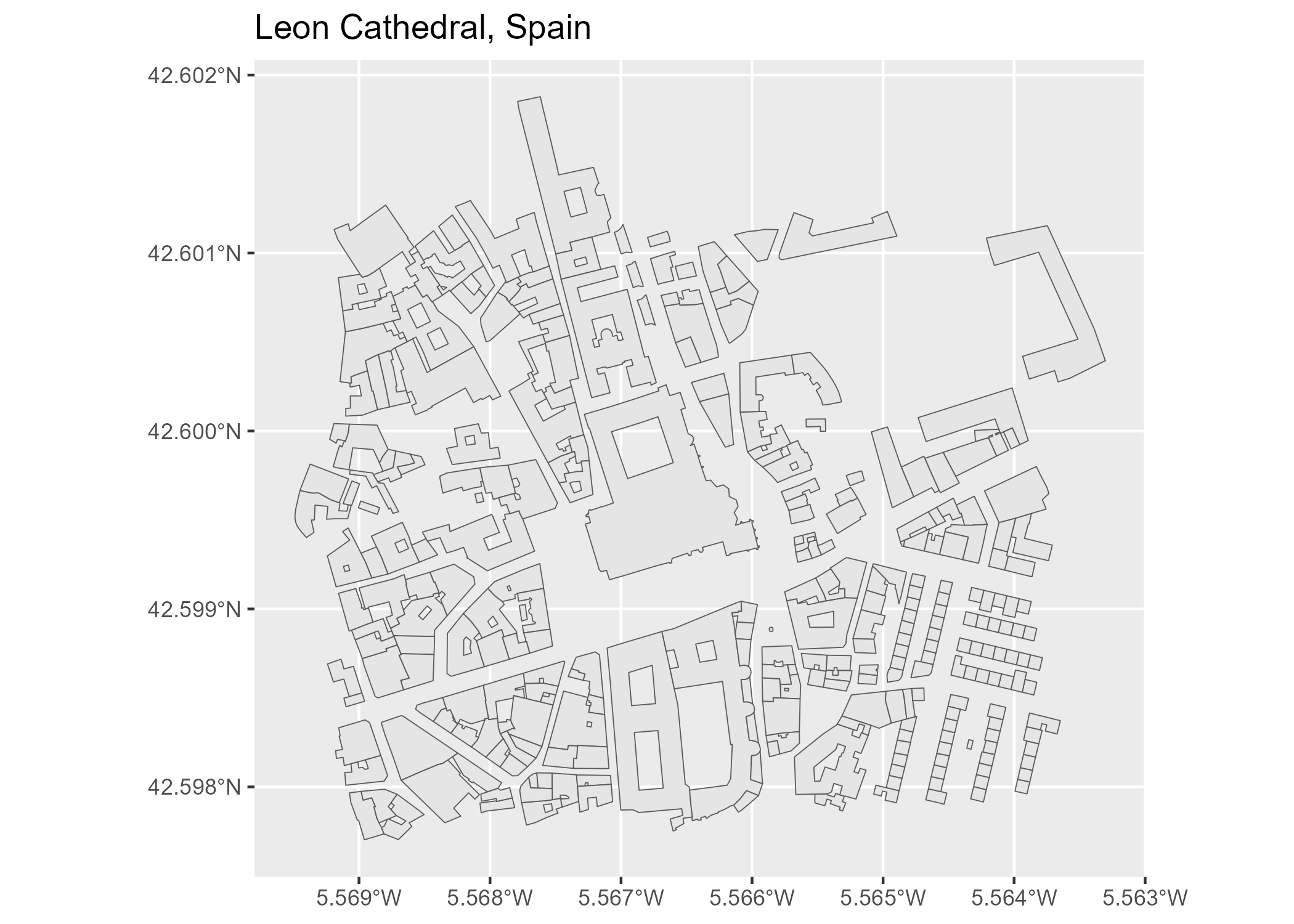CatastRo is a package that provides access to different API services of the Spanish Cadastre. With CatastRo, you can download spatial objects such as buildings, cadastral parcels, maps, and geocode cadastral references.
Installation
Install CatastRo from CRAN:
install.packages("CatastRo")SSL issues
The SSL certificate of the Spanish Cadastre presents some issues that may cause an error when using CatastRo (especially on macOS, see issue #40):
In CatastRo >= 1.0.0 you can try to fix it by running this line in your session right after you start using the package:
# Disable SSL verification
options(catastro_ssl_verify = 0)If you wish to make this setup persistent, write the same code in your .Rprofile:
# Open your .Rprofile with
usethis::edit_r_profile()
# And write on that file:
options(catastro_ssl_verify = 0)Package API
The functions of CatastRo are organised by API endpoint. The package naming convention is catr_*api*_*description*.
OVCCoordenadas
These functions allow geocoding and reverse geocoding of cadastral references using the OVCCoordenadas service.
These functions are named catr_ovc_get_* and return a tibble, as provided by the package tibble. See vignette("ovcservice", package = "CatastRo") where these functions are described.
INSPIRE
These functions return spatial objects in the formats provided by the sf or terra packages using the Catastro INSPIRE service.
Note that the coverage of this service is 95% of the Spanish territory, excluding the Basque Country and Navarre1, which have their own independent cadastral offices.
There are three types of functions, each one querying a different service:
ATOM service
The ATOM service allows batch-downloading vector objects of different cadastral elements for a specific municipality. The result is provided as sf objects (See sf package).
These functions are named catr_atom_get_xxx.
WFS service
The WFS service allows downloading vector objects of specific cadastral elements. The results are provided as sf class objects (see the sf package). Note that there are some limitations on the extent and number of elements to query. For batch downloading the ATOM service is preferred.
These functions are named catr_wfs_get_xxx.
WMS service
This service allows downloading georeferenced images of different cadastral elements. The results are provided as rasters in the format provided by the terra package.
There is a single function for querying this service: catr_wms_get_layer().
Terms and conditions of use
Please check the service’s downloading provisions.
Examples
This script highlights some features of CatastRo:
Geocode a cadastral reference
library(CatastRo)
catr_ovc_get_cpmrc(rc = "13077A01800039")
#> # A tibble: 1 × 10
#> xcoord ycoord refcat address pc.pc1 pc.pc2 geo.xcen geo.ycen geo.srs ldt
#> <dbl> <dbl> <chr> <chr> <chr> <chr> <chr> <chr> <chr> <chr>
#> 1 -3.46 38.6 13077A018… DS DIS… 13077… 18000… -3.4575… 38.6184… EPSG:4… DS D…Extract a cadastral reference from a given set of coordinates
catr_ovc_get_rccoor(
lat = 38.6196566583596,
lon = -3.45624183836806,
srs = "4230"
)
#> # A tibble: 1 × 8
#> refcat address pc.pc1 pc.pc2 geo.xcen geo.ycen geo.srs ldt
#> <chr> <chr> <chr> <chr> <dbl> <dbl> <chr> <chr>
#> 1 13077A01800039 DS DISEMINADO P… 13077… 18000… -3.46 38.6 EPSG:4… DS D…Extract geometries using the ATOM service
bu <- catr_atom_get_buildings("Nava de la Asuncion", to = "Segovia")
# Map
library(ggplot2)
ggplot(bu) +
geom_sf(aes(fill = currentUse), col = NA) +
coord_sf(
xlim = c(374500, 375500),
ylim = c(4556500, 4557500)
) +
scale_fill_manual(values = hcl.colors(6, "Dark 3")) +
theme_minimal() +
labs(title = "Nava de la Asunción, Segovia")
Extract geometries using the WFS service
wfs_get_buildings <- catr_wfs_get_buildings_bbox(
c(-4.134, 40.952, -4.131, 40.953),
srs = 4326
)
# Map
ggplot(wfs_get_buildings) +
geom_sf() +
labs(title = "Alcázar of Segovia, Segovia, Spain")
A note on caching
Some datasets and tiles may have a size larger than 50MB. You can use CatastRo to create your own local repository at a given local directory passing the following option:
catr_set_cache_dir("./path/to/location")When this option is set, CatastRo will look for the cached file and load it, speeding up the process.
Citation
Delgado Panadero Á, Hernangómez D (2026). CatastRo: Interface to the API Sede Electrónica Del Catastro. doi:10.32614/CRAN.package.CatastRo, https://ropenspain.github.io/CatastRo/.
A BibTeX entry for LaTeX users is:
@Manual{R-CatastRo,
title = {{CatastRo}: Interface to the {API} Sede Electrónica Del Catastro},
author = {Ángel {Delgado Panadero} and Diego Hernangómez},
doi = {10.32614/CRAN.package.CatastRo},
year = {2026},
version = {1.0.0},
url = {https://ropenspain.github.io/CatastRo/},
abstract = {Access public spatial data available under the INSPIRE directive. Tools for downloading references and addresses of properties, as well as map images.},
}Contribute
Check the GitHub page for the source code.
